Interview: Brazilian Filmmaker Gabriel Mascaro Discusses His Work
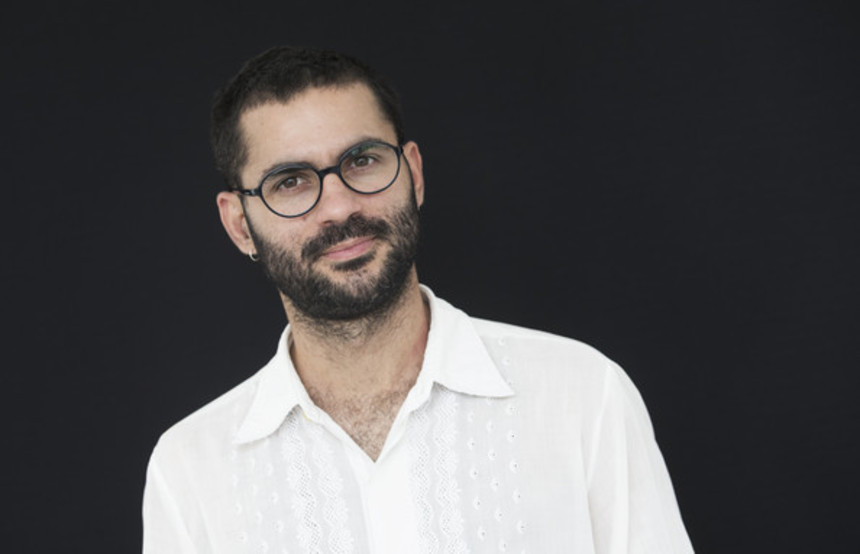
The Brazilian artist Gabriel Mascaro, having one leg in the visual arts and the other in cinema, already has several notable works under his belt, and Film Society of Lincoln Center is celebrating him as arising international auteur by organizing a retrospective of his works.
Gabriel Mascaro: Ebbs and Flows, running from 15-21 April, presents his feature works, documentary and fiction, showcasing the filmmaker as a master blender of fiction and reality and the chronicler of Brazilian social gaps, economic inequalities on the seamless intersection of political and lyrical, with formalistically daring fiction features.
In vertical documentary High-Rise (2009), Mascaro visits owners of luxury penthouses to provide a contemplation on social class, economic divide and culture through their eyes and candid yet hardly witty observations and remarks to uncover Brazilian mindscape of upper class. However, the interview reveal far more about the social situation beyond the upper echelons of penthouses and their narrow judgements. Equally ambitious is collective documentary Housemaids (2012), shot by seven teenagers in their households where housemaids serve with Mascaro interfering in the process in the editing. Sticking to the topics tackled in High-Rise, the filmmaker adds new layer in juxtaposition of privilege youth and underpaid working force spending majority of their life in someone´s else house. Deeply personal and sad histories of housemaids cross depictions of their daily routines and study of dynamics between patron and employee, two different classes and worlds.
Mascaro broke into fiction territory with August Winds (2014, read Patrick´s review), an underappreciated and surprisingly not enough talked about formalistic experiment. The filmmaker stages scenes and situations working from script however based on and inspired by true events and life itself. A contemplation on life and death, August Winds is as sensual as it is chilling endeavour merging strategies of documentary and fiction film and social and political plane. As Mascaro´s documentarian and visual artist instincts represent a visible and bold creative force, he continues in quest examining the topics he tackled in previous works. The result is anything but perfidious. A beautifully composed frames shot by the director himself, viewers venture into remote village where life is a bit different to rural areas notably in perception of life, death and forces of nature.
As of lately, Mascaro drew attention due to his sophomore fiction feature Neon Bull (2015, read Dustin´s review) that went on a winning streak since the premiere in Cannes. Set against the backdrop of vaquejada rodeos, the filmmaker follows a tight-knit group of cowhands working, traveling and living together. Similarly to some films of Bruno Dumont, the absence of a plot is palpable, though it opens doors to different storytelling modes, with the film sometimes verging on documentary. Mesmerizingly shot by Diego Garcia, Mascaro makes great use of widescreen shots and staging the action in-depth of the frame space. Telling the story mostly from the point-of-view of Iremar - cowhand by day and dressmaker by night – in a hypnotic and lyrical cycle of mundane rituals.
Neon Bull melds several selling points: great camerawork, storytelling which blends fiction and documentary elements into one cohesive form, a socio-economic situation tackled through the unexpected angle of busting gender stereotypes, an examination of human body in space... and the cherry on the top of the cake: the best sex scene. Both his fiction features and his singular auteur style are defined by combination naturalism of documentary films whilst finding poetical and lyrical motives and qualities, in format and substance alike.
At the occasion of Mascaro´s retrospective, ScreenAnarchy had a chance to sit down with filmmaker in Rotterdam to talk more about his works Housemaids, High-Rise and August Winds with Brazilian artist who was pretty open about his work and processes through which they are coming into existence. Mascaro reveals layered oeuvres dissecting mostly his fiction films explaining how reality interferes into his creative operations and acknowledging metatextuality that he subtly incorporated at several occasion, most visibly in August Winds where he himself plays a weather researcher.
Gabriel Mascaro: Ebbs and Flows runs from April 15-21 at the Film Society of Lincoln Center, New York
ScreenAnarchy: You graduated in social at the Federal University of Pernambuco. What was the shift from there to cinema?
Gabriel Mascaro: It is just a coincidence. When I was young, there were no film schools nor art school, so there were not a lot of options. I live in a city where those options were also very limited in terms of studies and I had no money to go to study in San Paolo or Rio de Janeiro.
I decided to stay here and study communication which was more generic but at the same time it was fun. I met lot of people that were also not very comfortable studying communication and we started doing plenty of things together, producing films among other activities at the university. It was a great time to be involved in different projects and find new horizons especially if those things are not very easy for you so you have to fight for them.
Did the studies help you actually in some way besides meeting likeminded people?
Maybe. You know in some way, the film Housemaids is a reflection of the dealing with performance, the image and about power relationships and asymmetric relationship between filmmaker and characters. It is also meditation on the craft of making films – documentary - performances. I can imagine that studies of massmedia, communication or journalism are definitely part of this film.
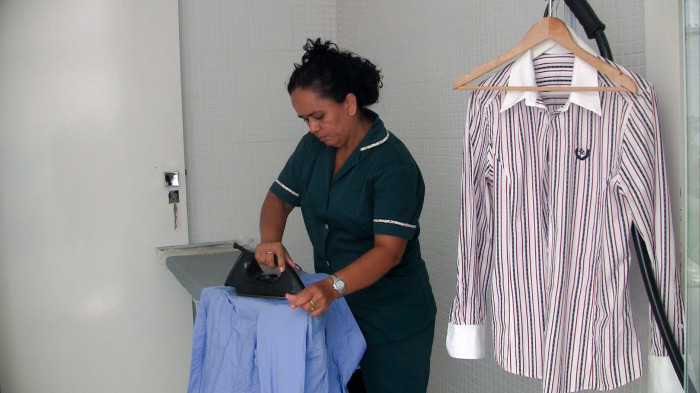
Housemaids are indeed interesting social experiment.
Yes, the displacement is one of the topics. Housemaids are about intimacy and power relationships inside a house. It brings to the fore the Brazilian cultural background of slavery in the contemporary day. We show how the colonial period in our history is assimilated into our present life and how we still have a long road to go with all the challenges to conquer – racial or gender emancipation.
The majority of housemaids are black women and even though Brazil is becoming a giant den of economical growth, the legacy of colonial times breeds contradictions in our society to this day. And we do not talk enough about that. This might be also the first thing a foreigner would start picking up after the first week spent here. You will sense there is something strange present since it is inherent in our culture - we do not think nor talk about it that much.
It is symptomatic for our contradictory country to live with these colonial relics day to day. Brazil is becoming a giant player in the economy on international level but is still plagued by colonial contradictions. In last ten years, labour party in the government changed a lot of things commending laws protecting employees. In the Brazilian constitution, the workers are entitled to holidays and social securities with the exception of housemaids. Can you imagine that, this was actual situation until a couple of years ago. There were huge discussions on this subject and reactions of Brazilian elites and upper-classes were just bizarre. They were opposing the change being against something that is for other employees completely normal.
How much footage you end up with before cutting it down to 75-minutes?
We had around fifty hours of material shot by seven teenagers. They had to shoot at least ninety minutes every day. This was part of the game I was playing with the teenagers “You must shoot one and half hour everyday if you want to participate in the project”. So you lined up a set of rules. If I did not create rules, the teenagers would rebel and we would not wind up with a film. I had to come up with boundaries to decide who would participate. So they had to shoot ninety minutes each day during the duration of the project. If they were tired, they had to mount the camera on tripod and let it roll.
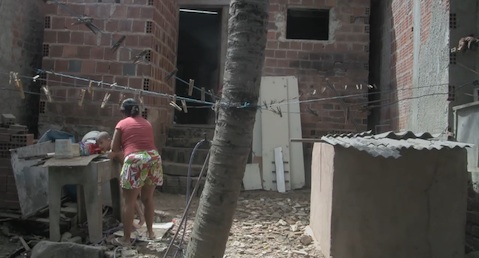
What was the process of casting the teenagers? Did you visit the households in advance of the project?
I decided to not have a personal contact with any of them - nor the housemaids, neither the teenagers. I had a local producer in each city where the chosen participants lived. The conceptual idea behind the project was that me as a director, I would have none contact with them whatsoever and I would create my political views and relationships with them solely through the image. This is why I excluded any personal contact even during the editing process.
The film also plays with the notion of asymmetric power relationships between the housemaids, the teenagers and me as a filmmaker and them as the characters. This uncomfortableness of the power relationships in every stage of the project contributed to the displacement of the documentary.
However the vibe of oppression does not show openly in the edited footage.
But the absence of oppression can be a sign of actual oppression. In general, teenagers are always showing off how cool they are.
Surely. When you know you are shooting yourself you are the sole one maker of your media representation and you can manipulate it however you please.
Exactly.
So this was one of the factors you took into consideration making this project?
The idea was to show the excess of the lack of oppression to unmask the oppression. The kids are trying to act and look like a cool boss - little boss - and at the same time they are worried about their image on camera. In some moments, you can see how they are trying to repeat something which is basically a performance or you see them fixing their hair to look handsome. And the film plays into the concept of the excess of the conflict vacuum to actually expose the conflict.
The lack of confrontation and even indication of confrontation is quite suspicious.
That´s it. In the absence of conflict, you can sense the conflict.
You said you handed the cameras to teenagers though there are certain moments in the film where cameras are operated by housemaids themselves.
That is a very important moment for me when I discovered that at some points, the rules I set up straight and clearly, were violated. But those situations where housemaids take charge of cameras are brilliant. For example, when one housemaid rides a car and tries to pass a message to her husband through on-camera monologue and other similar situations. You can see the breaking of the rules and those are important moments as well.
Did you edit the raw footage yourself?
Me and an editor, we worked on the material together.
What was the approach editing the material?
What I realised while editing the film was that relationships we create in our daily routines are intransferable. I could not make a film about Brazilian housemaid phenomenon, it is not a panoramic film but one consisting of singular and intransferable relationships.
As you can see, each relationship in the film is very complex and specific. This is the reason why I decided to edit the whole film without trying to establish a panorama going forth and back, mixing and blending in, and the result is almost an anthology-like structure of linear short films. We are not revisiting past stories neither their characters. And this strict editing rule serves also as a remainder that we cannot treat those relationships as blending situations. I could not mix them to create a kaleidoscopic or mosaic-like structure. I had to be strict about this to clearly state the uniqueness of the relationships and hence their intransferability and the intransferability of the relationships we create in our lives.
Even though you eschewed creating a panorama, viewers can identify common patterns between the stories.
That´s true. You can understand similarities in the housemaids´ backgrounds - a tragic history, serving as a housemaid from young age and living in someone else´s house. Can you imagine your private life? It is going to be a complete disaster. You cannot maintain the same degree of your family activities or the give the same amount of attention to your kids because you are basically donating your life to somebody else to be appropriated by other family.
The situation is complex and complicated. In another perspective, you can see how this housemaid issue is reproducing the gap between families in Brazilian society. If housemaids cannot take adequate care of their kids, the kids became abandoned and strayed wandering on streets, maybe getting involved in drugs and so on. It has wider social implications.
As one character in the film says, their lives are so complicated that the boss´ house and the work becomes sort of an activity to escape from their own reality. There is one housemaid that works solely in the night. During the day, she does not feel comfortable to work there because it is not her house but when the bosses are sleeping, she can feel to be a part of the house. So she switches work regime to create some kind of affectation for the space, to go beyond the service area, a kitchen, to create and feel the control over the house, over something she does not own.
And this is the crazy part how you can see the housemaid theme transcending the debate into various directions. I do not know if you know but lot of Brazilian upper-class has apartments in Miami. When the developers discovered the potential of this segment, they started to change the planning of apartments. Brazilian vacationing upper-class takes their housemaids with them. So they changed the initial concept of apartments to include, what we in Brazil call a service area and housemaid room - it is a complex with a kitchen, room with no windows and service area where they can wash. And this part of the house is isolated, the family does not eat in the kitchen, they eat in dining room apart from the kitchen. The kitchen and housemaids room is a part of another space, basically secluded. It is another world.
There is also this one particular case where a housemaid has actually a housemaid.
That shows that housemaid issue does not concern solely middle and upper class in Brazil. The exploitation of relationship duplicates also in the lower stratum of social ladder and it shows how it is rooted in our culture.
If a housemaid has an opportunity to have a housemaid, they will utilize it and they will even pay them less than the minimal legal wage. The exploitation does not stop and you can imagine if a housemaid spends the whole day in somebody´s else house, who is going to take care of her household.
And that is what I wanted to show on this particular character that housemaids are not the sole domain of middle and upper class, it is something inbred in our culture and we have to change it. When we understand now that it is cultural thing, it is difficult to accept it. And I want to show in the film that this is not a social trait specific for upper classes, it envelops the society in its entirety and the whole society has to deal with it.
Every housemaid has a tragic back-story which goes underdeveloped in the film. Didn´t you want to elaborate them more to present bigger portrait of the issue? Is it a taboo in Brazil?
It is a huge taboo but at the same time, the teenagers are trying to look cool so they do not want to go further into the tragic stories to avoid the conflict I mentioned earlier.
All right, because at first sight it looks like this element is downplayed intentionally through your editing choices. So the teenagers consciously avoided the subject while they were shooting?
Yes, I had absolutely no control over what they were recording. Regarding the shooting, my work started and ended by creating the rules they had to follow: the minimal daily material they had shoot, give the release papers to sign to the housemaids and do a little introduction of themselves on camera and explain why they were recording the material.
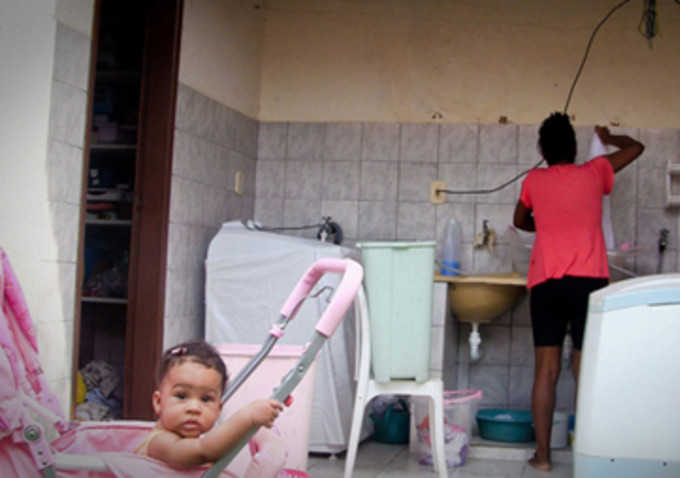
Because you had fifty hours of the material which you edited in 75-minute piece that´s why the question pops out whether it was editing choice or lack of the material regarding their sad histories.
It was shot properly but they did not reveal much. In a way, the film glides over the surface. But what makes a sense to me is how the surface can show us the political surface created through these performances. As much as on the surface we are, so much we are deep in the issue.
This surface is exactly the lid the Brazilian society has put on the subject. As much as we feel we are on the surface of the subject, as much we are immersed in it because you understand how culturally we are dealing with it. When you perceive it as a surface, we understand how difficult it is for us to go deeper. So it plays on the contradiction note which you can see also on the story of a boss who has for housemaid childhood best friend. They grown up together, they were childhood friends and now she works for them. Can you imagine?
It is almost as strange as a housemaid having a housemaid.
But it is very common in Brazilian middle and upper class to bring people from farms and countryside to cities what contributed to the migration started in 70s and 80s. And there is this magic moment when the boss´ son asked the housemaid if she is happy. And what follows is like 20-second contemplation before she nods that she is happy.
It was not a very convincing gesture though.
And for me, this is one of the most brilliant moments in the film. The fact she has to think about the answer gives away exactly the opposite to what she is saying. And you can sense during the whole film that what you actually see is in fact the opposite. And he continues asking why she is happy to what the housemaid replies because she is free. The whole situation is very paradoxical because you can totally understand she is not free. She has lost her life in the house of her best friend.
That is even more tragic.
It is. When we screened the film here in Brazil, there was almost unanimous reaction to it. People were crying. The film provoked strong reactions and you can see how it is affecting people. And the next morning, when those who have seen the film would wake up to the table with breakfast already prepared by their housemaid and they just would not bring themselves to eat it. They told me that they now cannot enjoy their breakfast because of my film.
But you started at the opposite pole of the social ladder in your documentary High-Rise having a completely different specimen of subject in front you the camera talking about the privilege of living in penthouses.
High-Rise deals with the characters previously mapped in a book of contacts rounding up specific social group. And this was the filter. The address book gathers people from upper-class background and this group of people is even more particular because they are not part of very sophisticated Brazilian upper-class. I am sure that the richest Brazilian people would not be willingly part of this book. So we are talking about very specific set of the upper-class that decides to be enlisted in the book.
Okay, they willingly and voluntarily become registered in the contact book. Is it relevant?
Yes, that is the crazy part because the book is like a complete guide of kidnapping. And that´s why I cannot imagine the sophisticated Brazilian upper-class would become willingly part of it when you give away all the personal details like name, address, telephone number and so on.
Why would you want to be a part of such book in the first place?
That is the first question. This is the group of people that is preoccupied with the subject of visibility. This book is not for public distribution, it is supposed to be distributed only among the people enlisted in the book. It is destined for close community.
And you called them?
I did call many of them and they are even more special because they live in penthouse which is very special in Brazil. The middle and upper class want to live in high-rises. It is not like in Europe where people are trying to avoid them since it is more like a social housing.
It is completely the opposite here in Brazil. The upper and middle class dream of living in high-rises since it is synonymous to safety and security. The concept of living well is completely different here. In Europe, you have ugly high-rises for low-income families and here, those ugly high-rises are reserved for upper class.
Have you talked to them before shooting the interviews to know what they characters approximately are?
I had the initial hunch that they would talk a lot about things I would disagree with. I decided strategically, aesthetically and politically, to not confront them while they were talking. I would not interfere in their monologues and use this excess of their statements without a proper conflict in the moment of interview and to harness the excess to access another layer where we could create ourselves our won critical opinion.
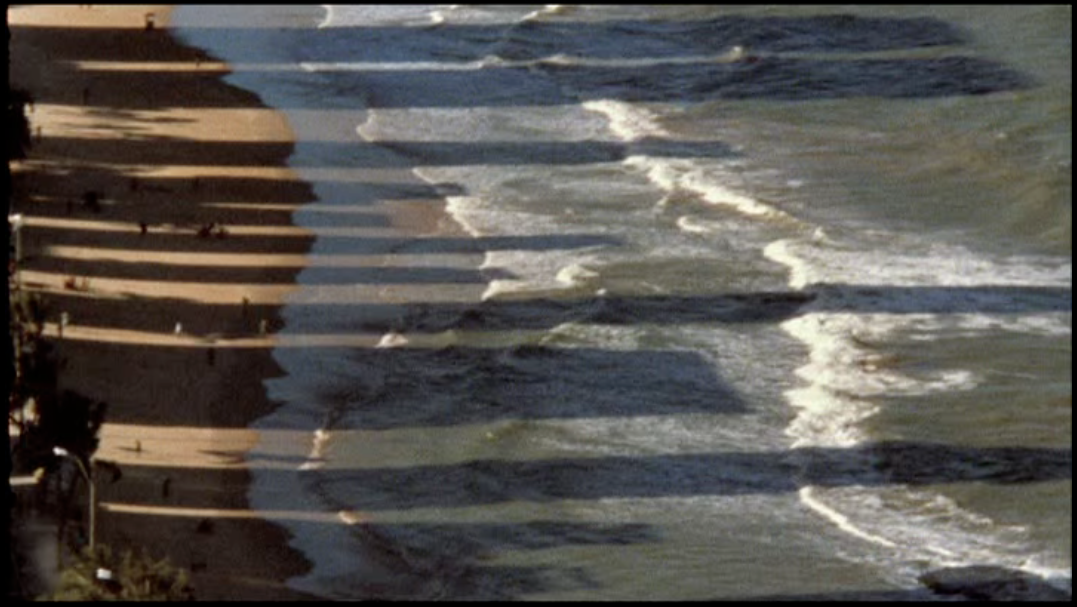
How did you conduct those interviews?
It was a proper interview minus the confrontation. I received their profiles before interviewing the subjects, my local producers conducted first interviews to prepare profiles. I knew beforehand what to ask, what would reveal more and to know the topics to go with. I knew their personalities in advance.
My crew did interviews via phone, did research and based on that they sketched up the profiles. But High-Rise is not necessary the opposite to Housemaids. The documentary Housemaids deals also with the social segment of teenagers, so it deals with both social groups at once. We can properly understand the relationship between boss, their offspring and housemaids rather than focusing solely on housemaids.
What was the initial impetus for High-Rise?
In Brazil, there is this ethical taboo and I have not seen any Brazilian film about Brazilian upper class. And High-rise is probably the first Brazilian documentary about upper class.
What is the reason for such primacy?
I think it has historical background because there is the idea filmmakers have leftist leaning and there is this prevailing opinion we tend to give the voice to oppressed groups, in this case lower income groups. In general, we are more prone to show the poverty and creating this illusion we are giving voice to the voiceless. But you have to fight for the voice, you do not get it. We should not give the voice, we should fight for it so you should give them a right o fight for it instead.
But you did not empowered upper-class in High-Rise.
Exactly that is why I did not decide to follow the same pattern as in shooting low income groups by presenting them in their daily lives. I went the opposite direction to present low income perspective through the optics of upper class. We can understand much more about Brazilian culture and social inequalities through the mindset of Brazilian upper class.
But you are dealing with specific upper class.
Yes, very specific, not a generic one and neither very sophisticated.
Why would others in the book did not want to participate in the documentary?
I can imagine only that they wanted to avoid this kind of publicity for safety reasons.
But they are already in the book.
However the book is not freely and publicly distributed. It has concrete recipients it is intended for.
You had the book.
I got hold of the book but illegally. For them, to be in the book is a token of social status.
What was the reaction to the documentary by the interviewees?
I have no contact whatsoever with any them.
Nobody threatened you?
I know there was one person that contemplated suing me but eventually the person dropped that intention to not create more publicity for the film. I could be sued but the controversy would just create more publicity for the case. I guess they dropped it to not be featured in television pop talk-show [Laughs].
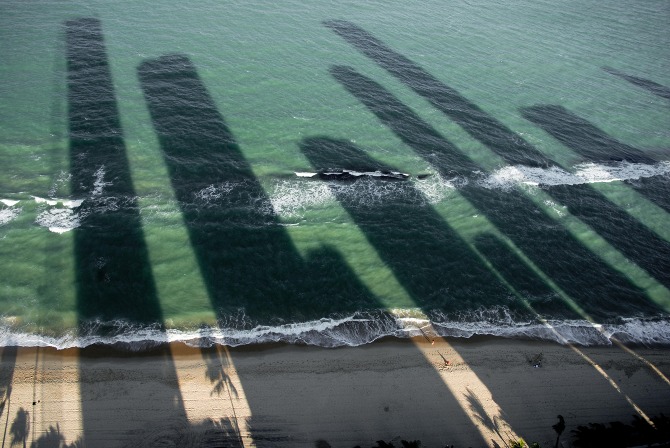
You moved from the city topography of documentaries to countryside and nature in your fiction features as for example in you fiction feature debut August Winds. Why this decision?
I like to be in contact with different subjects, perspectives and to think methodologically different in my projects. In Housemaids, I did not shoot a single image, I just organized what I have received while in August Winds, I worked with a very small film crew and I did almost everything by myself. It was almost a no-budget venture. I was an actor, a director, a scriptwriter, a cinematographer, an electrician, a technician.
I did lots of things including manual work and I was really a part of the film while in Neon Bull, I had much bigger crew- almost fifty people - bigger budget and I could do things differently. I like to experience different methodologies of work and put up with different challenges. There was absolutely no professional actor on the set of August Winds whereas in Neon Bull, there were a lot of Brazilian pop stars. I like displacement as well.
Have you had a fully written script for August Winds?
Well, it was fully written but not a script in the conventional sense of the word. I had lots of situation sketched in the script where I could at any point rewrite the script during the research or the process of preparation for example the relationship of Shirley played by Dandara de Morais, the protagonist, and her granny. The relationship they have between themselves enabled for various situations to be created and the script to be adapted to it.
But was the core structure untouched?
The basic structure was maintained but I could tinker with the smaller elements in the story.
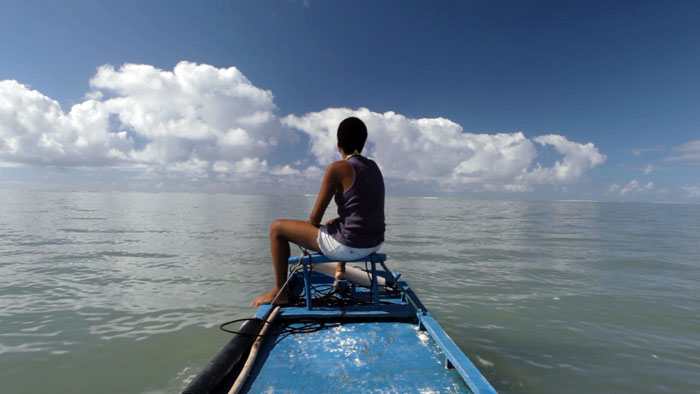
The film starts freeloading more in observational style before the plotting kicks in. There is no hint of fiction, it looks completely like a documentary.
This was intentional to play aesthetically with a pastiche. There are moments with naturalistic fiction feature mixing with documentary hybrid style. There are some purely documentary parts, for example in the segment of wind research and viewers may wonder what the fuck is happening when it looks like an exploration of a relationship between a foreigner and the local community.
And then we abruptly slip into almost a genre film territory. We played with film differently at various moments. So it creates an inner displacement in terms of aesthetics within the same film. It was rather a film experiment.
When you mentioned you played with genres, what have you in mind specifically?
The idea was to bring this naturalistic approach together with imagery generally associated with horror genre, as corpse or graveyard you see in the film. And this almost iconic horror imagery we immediately assign to fiction usually however I inserted it into an environment that looks like a documentary film. And people frequently ask me whether I have really found a dead body in the sea. And that is funny to know that the film works as borderline documentary and horror pastiche, a hybrid between scripted plot and documentary perspective.
It is indeed very convincing and the dead body, the graveyard and all around does not bring horror into mind since it is so naturally blended into the whole story.
This was the challenge. How could I bring elements from the genre realm and interweave them into the story to be accepted as natural, as reality without the usual horror genre strategies or cultural codes. How could I insert dead body into documentary-stylized film. How can I use screeching sounds we usually hear in scary movies to the documentary setting examining life and death and sexuality.
There is a moment when one character remarks “they have no care for the dead” and it feels like a political statement. Is August Winds also a political film?
Surely. I think our whole life functions in this political dimension and even the film that we could perceive as a dream of sex, coconuts and coca-cola. The film unspools in a space that is not isolated from the world and characters are not naive. The female protagonist Shirley is very empowered and she wants to become a tattoo artist and all the characters deal with difficulties of the state when even officials do not care about dead bodies and do not proceed to investigate the circumstances. People are dying in the sea and the police do not come so you need to handle the corpse all by yourself.
How did you direct the people portraying your characters when they were non-professional actors?
That was another challenge but magical as well. It was very special to work with somebody that has never been to cinema in their life and also to be able at the same to perform very beautiful sex scene on coconuts whilst convincing them that even this can be something creative, artistic and to be shared as an experience together.
They did not only have any acting experience whatsoever but they have not even seen a film in their life?
The closest theatre to this village is more than an hour of driving. They did not have a lot of conscious about the acting process but their background was basically soap opera. Since they have seen only soap operas, this was in their minds while we were shooting the film. We worked closely to soap opera.
But soap opera works a lot with melodrama and there is hardly any melodrama in August Winds.
Yes, but they did not have any idea what the final result will look like.
Your fiction films, August Winds and Neon Bull, can be described as poetical realism.
I try to find magical moments in my films where reality can transcend. And how the strategies of fiction can be understood as very magical experience where we do not know where one things starts and the other ends. And this is also how I understand life. I do not know where fictional and real experience starts and ends in real life. Everything is for me mixed together. And also how we understand fictional as real experience. How can a character really live something very real even if it is purely fictional in terms of process.
Considering what you have just said, is something actually real in August Winds or is everything a product of fiction?
That is very difficult for me to say and I do not think within these boundaries. For me, everything is completely integrated. I do not consider fictional and documentary as opposite. The script and the moment of producing blend together and change constantly, so I do not even remember whether something was real or not- incidental or proposed.
For example the graveyard, did you build it as a set design or was it an actual location with own history?
The film came to me first, it always does, when I was travelling this region and saw a real graveyard being washed away by waves. I went and met members of local community who have parents buried in this very graveyard. And they have very special understanding of death and life.
As the waves clashed with the coast and necessary with the graveyard, they washed out human remains and people would found them on the shore. They collected the remains and buried them again although they had a discussion whether to perform Catholic burial rites again or not. There was also another option to leave the remains where they have been washed out and to let the sea to take them.
So even though the Catholic religion is deeply rooted, they still have the fishermen culture mentality respecting the forces of sea as a powerful element. Specifically on their standpoint to the dead bodies, you can understand their relationship to death. They do not have a city mentality when it comes to this subject and you can find human bones lining the coast.
And this revelation led me to make August Winds where I wanted to create fictional experience pervading the real one. And there is also wonderful moment in the film when protagonist shows a skull fished out of the sea to old man sewing a fishnet. It is the real first contact. When I did the research, I found out there lived a man in this region with a golden tooth, so I incorporated this discovery into the fiction of the film by creating a prop skull with golden tooth.
And to our surprise, when she Shirley him and asked about the deceased holding up the prop skull, the fisherman remembered this one particular person and told this actual story about him. We did it on just one take and if you re-watch this scene you can noticed her amazement when she goes out of character asking “did you know...?”.
The fisherman tells the whole story about this golden-tooth guy and that is very magical moment, totally unscripted, and we are re-creating something real through the strategies of fiction and from the minds of people living in the local community.
When you now explained the genesis of August Winds with intention to create horror genre pastiche, to blur or completely wipe off the boundaries between reality and fiction and now this real-life impetuses, the film works surprisingly homogeneous and organic and does not show seams of this postmodern quilt.
Yes, but if it looked like an overdone reflection on making films, it would be too much and overtly rational. When we bring these simple props and elements of horror genre, like for example the skull, we are pushing boundaries by tying them to the actual reality. And the fisherman replies quite naturally without any reference to horror or scary movies virtually personalizing the prop in the form of very intimate statement on how he dealt with life and death on that particular place.
Thus he became co-creator of your film.
Of course.
There is a passage where you step in front of the camera as a wind researcher. Why did you decided to insert this part virtually unconnected to the events in the film in regard of the plot?
It shows a weird relationship behind the idea making of a film being a stranger and bringing odd tools to disrupt daily routine of locals. You are changing their lives but at the same time you are violating their life. It is a gesture of violence. I do not see films in a positive way and such violent gestures are part of the culture of making films and I try to expose that with my character. Like the fisherman, the wind researcher deals with his prime material, but both of them come from completely distant worlds. Even though they both use winds, it is for different purposes and this makes them so close yet so far simultaneously.
As in your documentary works, the social plane is also into the fore of August Winds.
The film shows a very vulnerable community without contact to the state - completely abandoned by the state - but at the same time, their perspective is not naive. They are not isolated from the reality. They are part of the contemporary world, the characters listen to current pop songs.
So their lives are very contemporary even though they live geographically isolated. And it is also very mythological place since it lies in the tropical convergence zone. And here you can see the phenomenon of rising of the sea level so sensationalized in the massmedia because of global warming in very minimalistic understanding.
As the sea rises, it washes away the graveyard of local people and this is not regard as international issue but a very local one in the film. And maybe we can understand more while facing this intimate perspective of global phenomenon affecting a small group of culturally different people and interfering in their daily life and death. But I am not trying to bring these elements in the film as environmental manifesto.
Did the locals have problems with you shooting the film around those parts?
No, the shooting was very playful experience for them. They had fun with someone like me making a film there. But as I mentioned, it was also violent because I disrupted their daily routine as I was asking them to be silent or to turn down radios, so this part was boring for them.
For them, it was funny to see a fake dead body everyday in front of their house. For example, when we had the religious ceremony scene for the cadaver, I said to the children that we are going to make a funeral in the night. And when I came back to shoot the scene, the children prepared candles so it was very collaborative art direction. They created the art production design for the scene based on their local customs and what was natural to their culture.







